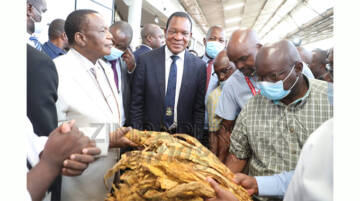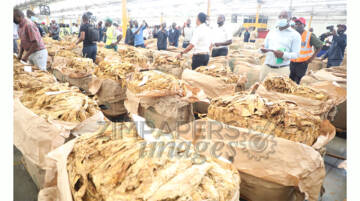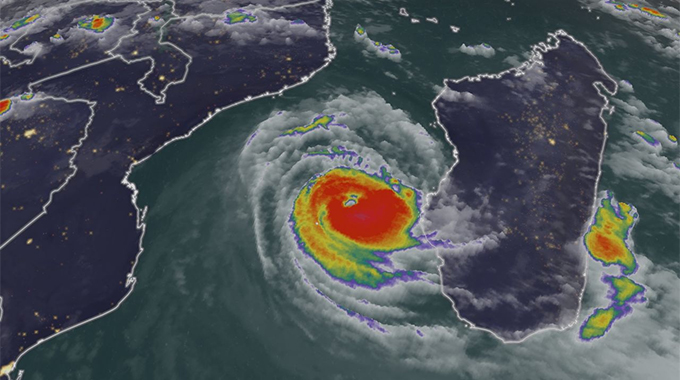Strong start to tobacco selling season

Mukudzei Chingwere and Precious Manomano
The 2023 tobacco selling season officially opened yesterday with the Government calling for transparency among actors in the industry to eliminate farmer deprivation by middlemen while enhancing fairness and sustainability in contract and auction sales.
The first bale fetched US$4,35 per kg which was slightly higher than the US$4,20 per kg fetched by the first bale last year.
Sales are being conducted at the Tobacco Sales Floor (TSF) and Premier Tobacco Auction Floors (PTAF).
The official opening was held at the TSF where the auctioning of the first bale was witnessed by Vice President Dr Constantino Chiwenga as well as Lands, Agriculture, Fisheries, Water and Rural Development Minister Dr Anxious Masuka.
Production is this year expected to increase by 8,5 percent year-on-year and foreign currency retention hike is part of Government’s efforts to ramp up production to a national target of 300 million kg by 2025 which is a key anchor of the broader national strategy of an upper middle-income economy as set by President Mnangagwa.
The golden leaf, as tobacco is colloquially referred to, is the country’s single second largest foreign currency earning export product after gold and the Government is keen to see its continued production growth, as Government targets to grow the sector to a US$8,2 billion economy.
Officially opening the 2023 tobacco marketing season yesterday, Vice President Dr Chiwenga urged Tobacco Industry and Marketing Board (TIMB) to ensure fairness as a regulatory board adding that growers should get a decent return for their effort.
“As the 2023 tobacco marketing season takes off, TIMB should enhance transparent and fair tobacco sales at contract and auction floors including analysing, recommending, improving and facilitating equitable transparent and profitable sharing of expenses and profits throughout the tobacco value chain,” he said.
“Our eyes are fixed on the role of tobacco in uplifting livelihoods in line with our President Dr Mnangagwa’s vision of an empowered and prosperous upper middle-income society by 2030.
VP Chiwenga commended successful tobacco farming enterprises and encouraged the rest to develop proper business models for tobacco farming.
The tobacco sector alone had the potential to anchor the Zimbabwean economy as it possessed huge opportunities for growth.

Vice President Constantino Chiwenga accompanied by Lands, Agriculture, Fisheries, Water and Rural Development Minister Dr Anxious Masuka look at the type of tobacco on sale during the official opening of 2023 tobacco selling season at the Tobacco Auction Floor in Harare yesterday.
VP Chiwenga said Government’s eyes were transfixed on the role of tobacco in uplifting people’s livelihoods by ensuring that agriculture in general was a key pillar of Zimbabwe’s national development strategy in line President Mnangagwa’s vision of transforming Zimbabwe into an empowered and prosperous upper middle-income society by 2030.
“Stakeholders in the whole tobacco value chain, from input providers, growers, contractors, bankers, off-takers and many more, all wait in anticipation of reaping the rewards of a long and challenging tobacco production season,” said VP Chiwenga.
“As the regulating authority, the attention and focus of the Tobacco Industry and Marketing Board should be fixed on the entire value chain in order to ensure that there is fairness, ethical behaviour and probity, transparency, accountability, discipline, equity and sustainability in this important crop value chain. These are the values that define our tobacco industry.
Through the Tobacco Value Chain Transformation Plan, the country was aiming to build the industry “Farm by Farm” into a US$5 billion industry by 2025.
It was disheartening that Zimbabwe exported 98 percent of its tobacco in semi-processed form, which meant it was literally exporting jobs and value.
“Agriculture contributes to export earnings and the flagship is tobacco. I am proud that tobacco production in the country has rebounded significantly since the land reform programme.”
Government was also hoping all stakeholders in the tobacco marketing process had planned for a smooth season with no bottlenecks to ensure fair pricing and timeous payment of growers.
The Tobacco Transformation Plan was also focusing on localising financing of tobacco production and Cabinet had already approved a US$60 million seed fund for this purpose.
TIMB Board Chairman Patrick Devenish urged tobacco companies to ensure that growers were paid in full and within 48 hours of sales completion adding that failure to do that would attract stiff penalties, suspension or cancellation of operating licences.
Some growers who had outstanding debts to contracting companies as well as TIMB for the Tobacco Inputs Credit Scheme (TICS) from the previous season were supposed to pay back so that all players in the value chain operated profitably.
“The industry together with the Reserve Bank of Zimbabwe have jointly put in place improved payment measures to ensure that tobacco growers get full value for their crop and are simultaneously paid within the shortest possible time.
“To enforce this, we stand guided by the Contractors’ Compliance Administration Framework. All tobacco merchants and contractors have signed it and have been made aware that they are supposed to pay growers within 48 hours of sales completion,” he said.
He said he was aware that some tobacco growers have not been paid since last season and plans were in place to ensure growers were paid in full.
Mr Devenish encouraged farmers to notify TIMB if they were not paid within 48 hours adding that side marketing was prohibited in the industry to promote sustainability of the sector.
Those entering sale points this season were supposed to be fully vaccinated (2 doses) with the booster dose (3rd dose) being an added advantage.
Farmers were advised to wash hands with soap and running water, sanitise, observe social distancing and wear masks properly.

The Tobacco Transformation Plan was also focusing on localising financing of tobacco production and Cabinet had already approved a US$60 million seed fund for this purpose.
Minister Masuka said sustainability in the production of tobacco was needed for farmers to assure markets that they were producing tobacco responsibly.
“The tobacco value chain transformation strategy is alive; we wish to localise financing of tobacco so that we can retain more of that value. We also wish to transform the tobacco sector so that we don’t export value and jobs and increase value addition and beneficiation. I look towards investments by local and foreign players,” he said.
Farmers who were at the floors yesterday were excited with the prices at the auction floor saying they are assured of good payments adding that this will motivate them to continue sustaining in the tobacco farming.
Mr Best Herege from Guruve said the prices so far are good adding that timeous payment is the critical component to ensure sustainability.
“So far we are happy with tobacco prices but we appeal for the authorities to ensure that tobacco at the auction floors get similar prices with that one which is sold at the contract floors because the way we produce our tobacco is the same so there is no reason to charge different prices like what we were witnessing in the past years,” he said.
Mrs Tariro Machingura of Rusape urged farmers to be vigilant and protect their hard-earned incomes and finance the next season adding that there is a need for farmers to be careful of sex workers who usually snatch their pockets at the floors.
“We encourage farmers not to be extravagant and save their hard-earned money and be able to finance next season’s operation. We hear a lot of stories here at the floors that most men are targeted by sex workers, be bold and ensure that you carry all your cash and surrender it at home,” she said.
Tobacco Farmers Union Trust vice president Mr Edward Dune said all farmers were looking forward to a rewarding tobacco marketing season.
This season, tobacco farmers will be paid 85 percent of their sales proceeds in foreign currency and the remaining quarter in local currency deposited into their RTGS accounts, converted at the prevailing auction exchange rate on the day of sale.
The 85 percent will be paid directly into the growers’ foreign currency accounts and this is treated as free funds while the 15 percent local currency will be deposited into the growers’ local bank accounts or e-wallet
The bulk of the tobacco will be sold through contract floors as 95 percent of the crop is grown under contract system while only 5 percent farmers are self-funded or are able to borrow money from banks.
Government has called on the Tobacco Industry and Marketing Board (TIMB) to enhance transparency and fair tobacco sales at contract and auction floors including analysing, recommending, improving and facilitating equitable sharing of proceeds throughout the tobacco value chain.
The call was made by Vice President Dr Constantino Chiwenga when he officially opened the 2023 Tobacco Marketing Season yesterday with an announcement that farmers will this year get 85 percent foreign currency retention, up from 75 percent last season.
The Tobacco Value Chain Transformation Plan launched by Government is aimed at accelerating localisation of tobacco funding to 70 percent of the cost of production by 2025, and raise tobacco productivity and increase production from 262 million kg per year to 300 million kg by 2025.
The plan seeks also to increase the production of alternative crops and increase their contribution to the farmers’ incomes to 25 percent by 2025 as well as increase the level of value addition and beneficiation of tobacco into cutrag and production cigarettes from 2 percent of total tobacco produced to 30 percent in order to increase exports of cigarettes by 2025.







Comments